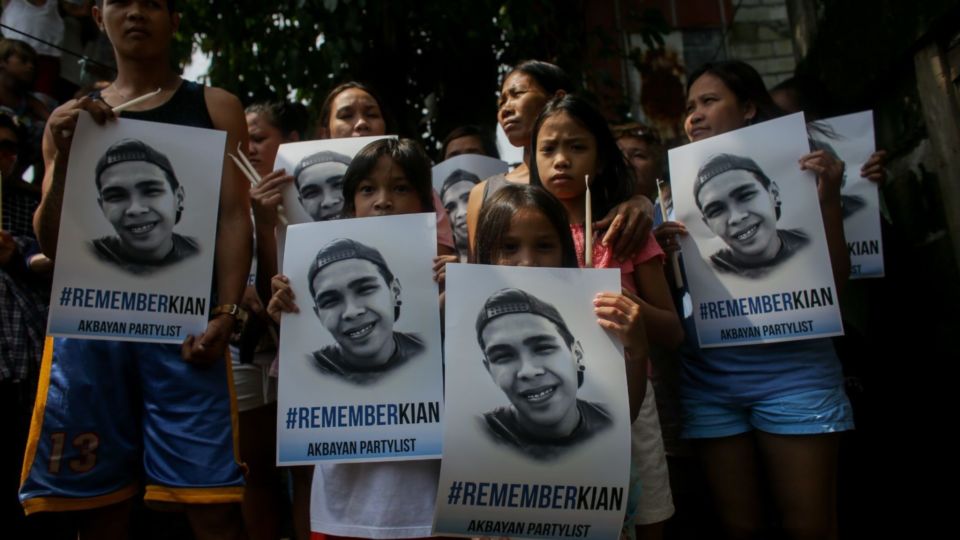A Metro Manila court has convicted a policeman for torturing two teenagers and planting evidence on the boys who were later found dead, court documents show, in a rare ruling against an officer linked to then-President Rodrigo Duterte’s controversial drug war.
Officer Jeffrey Perez was found guilty of violating the country’s anti-torture law and “planting evidence” on the two teenagers, Judge Rodrigo Pascua Jr., of the Regional Trial Court Branch 122 in Caloocan City, ruled.
Among other punishments, the judge sentenced Perez to two life terms in prison and disqualified him from ever seeking employment as a public officer.
“[J]effrey S. Perez is hereby found guilty beyond reasonable doubt for all the crimes charged against him,” according to an excerpt from the Nov. 10 ruling seen in court documents released on Wednesday.
In this case the deaths of Carl Angelo Arnaiz, 19, and Reynaldo de Guzman, 14, occurred in 2017 days after the widely publicized killing of Kian Loyd delos Santos, a 17-year-old student who was murdered by police near a pigsty in northern Manila.
In 2018, when Duterte was still in power, three officers were convicted of Kian’s murder – a verdict that brought the first convictions against police involved in carrying out the president’s crackdown on illegal drugs.
The administration of President Ferdinand Marcos, who succeeded Duterte in June, is under pressure to allow investigators from the International Criminal Court (ICC) to enter the Philippines as it probes Duterte over alleged massive human rights violations in the drug war.
Arnaiz was killed in August 2017, in what police claimed was a shootout with arresting officers. Police said officers were responding to a call for help by a taxi driver, who allegedly had been held up by Arnaiz, a former student at the University of the Philippines.
De Guzman, more popularly known as “Kulot” to his friends, was missing for weeks. His body, bearing about 30 stab wounds, was found in a creek in the northern province of Nueva Ecija.
How the bodies of Arnaiz and de Guzman were found separately remains a mystery because the two friends were reported to have disappeared together after they went out for a snack on the evening of Aug. 18, 2017.
But Carlito and Eva Arnaiz, Carl’s parents, demanded a thorough reinvestigation of the case, believing that their son had no reason to rob anyone because he was constantly given allowance money. Besides, the student did not own a gun, nor knew how to fire one, according to court records.
Then his parents brought the case to the state’s Public Attorney’s Office (PAO), which conducted a forensic investigation. Its findings “buttressed their suspicion that there was neither a legitimate operation, nor a shootout.”
“The killing of Carl was intentional,” the PAO said, adding that multiple gunshot wounds were found on his chest.
The parents of de Guzman, meanwhile, told prosecutors that they had reluctantly agreed to let their son go out that night. When he did not show up the next day, they launched a futile search, only to read news about their son’s body being discovered in Nueva Ecija days later.

The two teens’ deaths came days after delos Santos became the face of the victims of Duterte’s drug war, after police killed the 17-year-old.
The officers were seen on a CCTV camera dragging him away before they shot him near a pigsty. This contradicted the official police version of events that said the boy had provoked a shootout by pulling a gun on the officers.
A wave of public anger followed, forcing Duterte to remove the officers from their posts. Rights groups then hailed his decision, but the president reinstated the erring officers months later.
In September 2018, however, a court convicted the three officers for the murder of delos Santos.
‘An important step’
Carlos Conde, the Philippine researcher for Human Rights Watch, welcomed the conviction of Perez in the latest case, but said it could not be considered “complete justice.”
“This buoys the spirit of the families and validates the struggle of many of the thousands killed in the drug war to continue their quest for justice,” Conde told BenarNews. “We hope this continues. This is an important step to ending impunity in this country.”
The conviction adds pressure to the Marcos administration, he said, because it backs findings by human rights groups that arresting officers have a penchant for planting evidence against drug suspects.
“If Marcos is serious about his rhetoric lately that he is committed to human rights, he should celebrate this verdict,” Conde said. “But more than that, he should ensure that the ICC can come here unhampered to investigate.”
Last month, national police chief Gen. Rodolfo Azurin told foreign correspondents here that Philippine law enforcement agencies had killed 46 suspects since Marcos took office in late June. This happened despite the president publicly announcing a policy shift to use minimum force in drug-related arrests.
Chel Diokno, whose Free Legal Assistance Group provides assistance to families of drug war victims, noted that in the Philippines, “justice comes in trickles for victims of the war on drugs.”
“While the conviction punished the torturer, it did not punish the officials who set the wheels in motion for the thousands to be tortured or killed,” Diokno said.
His late father was imprisoned by the new president’s late father, Ferdinand E. Marcos, who ruled the Southeast Asian nation for two decades until he was removed from office in a people’s revolt in 1986.
By Jojo Riñoza and Basilio Sepe / BenarNews
Copyright ©2015-2022, BenarNews. Used with the permission of BenarNews.




